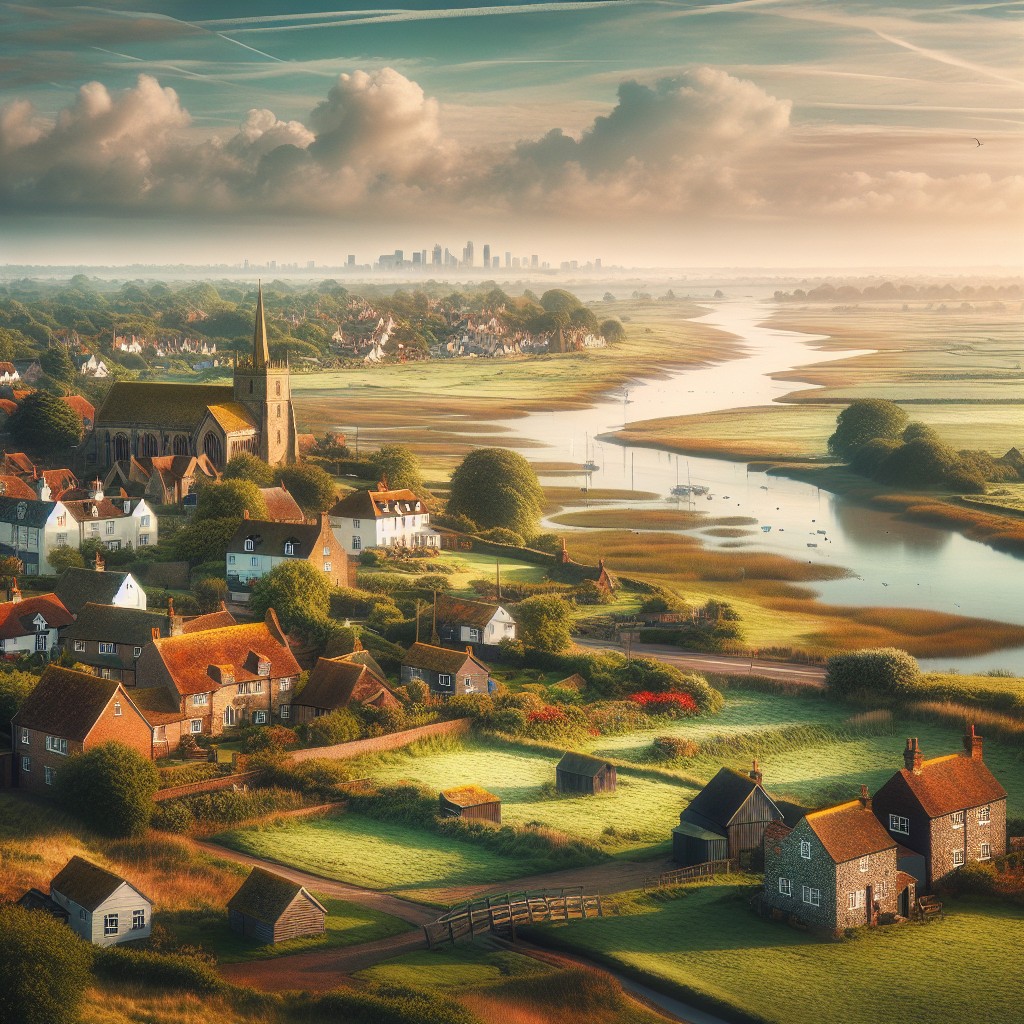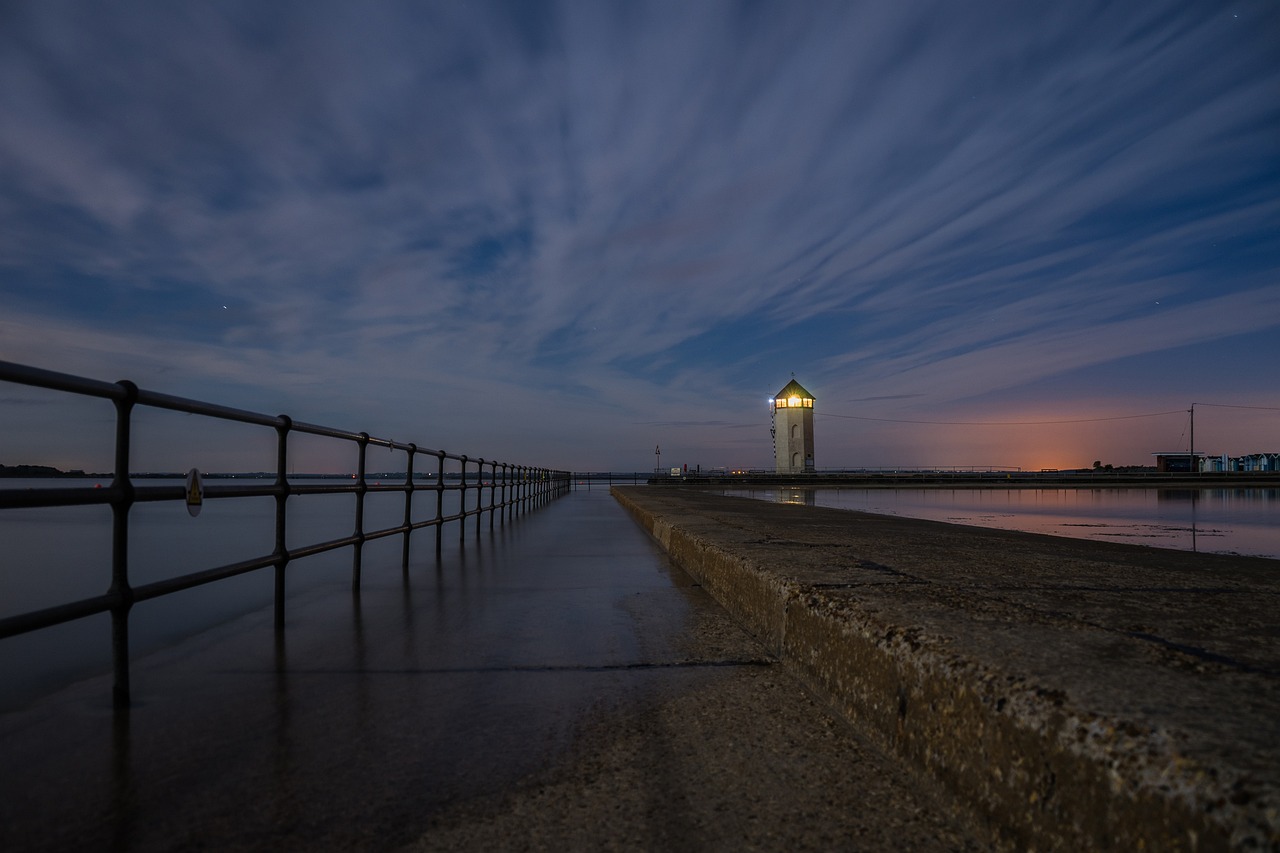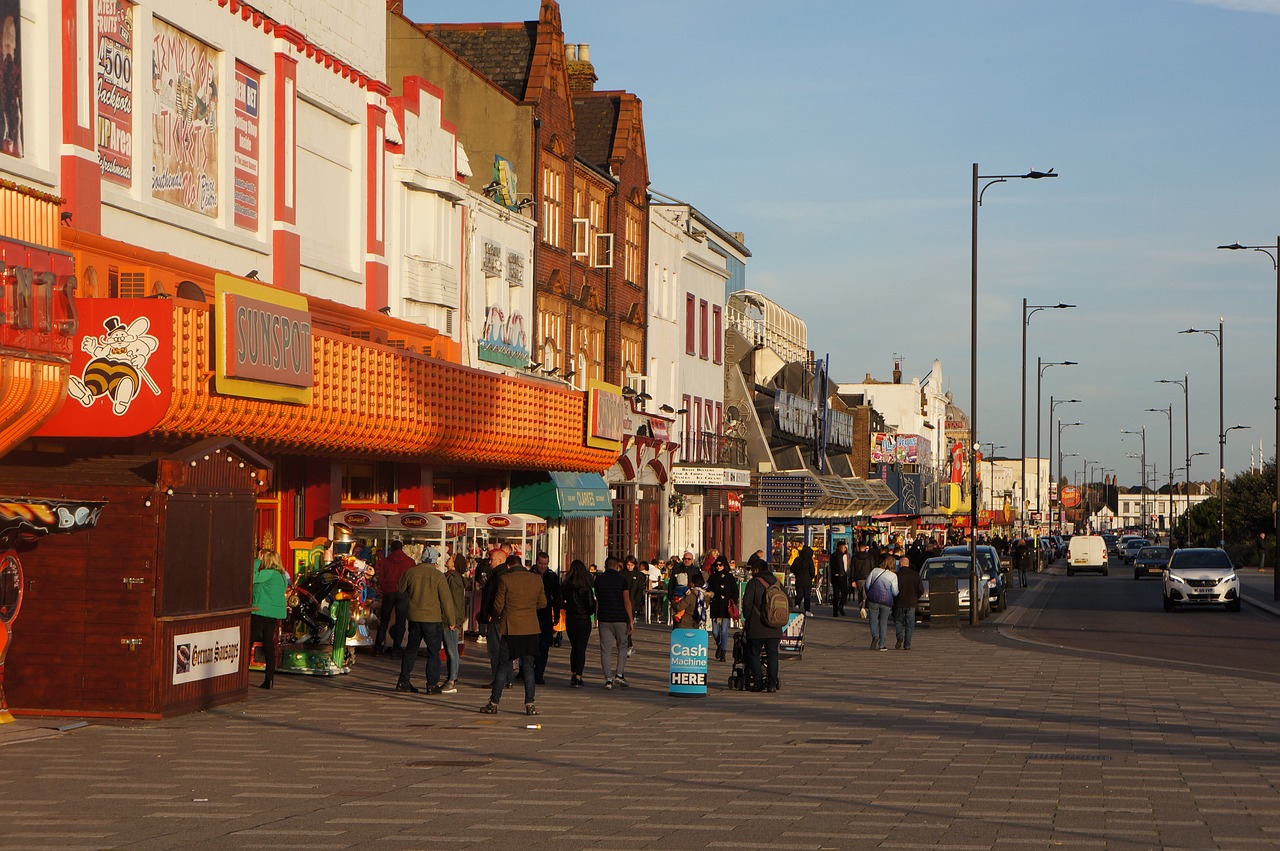
Essex is a county located in the southeast of England, bordering the counties of Suffolk and Cambridgeshire to the north, Hertfordshire to the west, Kent across the River Thames to the south, and London to the southwest. With its close proximity to London, Essex has become an important commuter belt, attracting many residents who work in the capital but prefer to live in a more rural or suburban setting.
Summary
- Essex is a county in the southeast of England, bordered by London to the west and the North Sea to the east.
- Essex has a rich history dating back to Roman times, with notable landmarks such as Colchester Castle and the ruins of Hadleigh Castle.
- The county’s geography is diverse, with coastal towns, rural villages, and urban areas like Basildon and Southend-on-Sea.
- Essex experiences a temperate maritime climate, with mild winters and cool summers, and occasional extreme weather events like flooding.
- The population of Essex is over 1.8 million, with a mix of ethnicities and ages, and a growing number of young professionals and families.
Historical Significance of Essex: From Roman Times to the Present Day
Essex has a rich and varied history that dates back to Roman times. The county was originally settled by the Trinovantes tribe, who were conquered by the Romans in AD 43. The Romans established a number of settlements in the area, including Colchester, which became the capital of Roman Britain. Today, Colchester is known for its well-preserved Roman walls and castle.
During the Anglo-Saxon period, Essex was divided into several small kingdoms, including the Kingdom of Essex. The county played a significant role in the English Civil War, with Colchester being one of the last Royalist strongholds to fall to Parliamentarian forces. The Industrial Revolution brought significant changes to Essex, with the growth of industries such as textiles and engineering.
Today, Essex is a thriving business hub with a diverse economy that includes sectors such as manufacturing, finance, and technology. The county is home to many major companies and has a strong entrepreneurial spirit.
Geography and Topography of Essex: A Land of Contrasts
Essex is known for its diverse landscape, which includes a long coastline along the North Sea, marshes and wetlands in the east, and forests and farmland in the west. The county is also home to several Areas of Outstanding Natural Beauty, such as Dedham Vale and the Dengie Peninsula.
The rural areas of Essex are characterized by picturesque villages, rolling countryside, and historic buildings. In contrast, the urban areas are bustling with activity, with towns and cities such as Chelmsford, Basildon, and Southend-on-Sea offering a range of amenities and attractions.
Notable landmarks in Essex include the historic town of Colchester, with its Roman walls and castle; the seaside resort of Southend-on-Sea, with its iconic pier; and the Dedham Vale, which inspired the paintings of renowned artist John Constable.
Climate and Weather in Essex: What to Expect
Essex has a temperate maritime climate, with mild winters and warm summers. The county experiences a moderate amount of rainfall throughout the year, with the wettest months typically being October and November.
During the summer months, temperatures in Essex can reach highs of around 25°C (77°F), while in winter, temperatures can drop to around 2°C (36°F). Snowfall is relatively rare in Essex, but it can occur during particularly cold winters.
Population and Demographics of Essex: Who Lives Here?
Essex has a population of over 1.8 million people, making it one of the most populous counties in England. The county is known for its diversity, with a mix of ethnicities and cultures represented among its residents.
The population of Essex is also relatively young, with a median age of 38.6 years. The county has a higher proportion of younger residents compared to the national average.
There are several notable communities and neighborhoods within Essex, each with its own unique character. For example, Chelmsford is known for its vibrant city center and cultural offerings, while Brentwood is popular for its suburban feel and proximity to London.
Economy and Industry in Essex: A Thriving Business Hub
Essex has a diverse economy that encompasses a range of industries. The county is home to many major companies, particularly in sectors such as manufacturing, finance, and technology.
One of the key factors driving Essex’s economic success is its proximity to London. Many businesses choose to locate in Essex due to its lower costs compared to the capital, while still benefiting from its close proximity to major transportation routes and international markets.
Essex is also home to several business parks and innovation centers, which provide a supportive environment for startups and entrepreneurs. These facilities offer access to resources and networking opportunities, helping to foster innovation and growth.
Education in Essex: Schools, Colleges and Universities
Essex has a strong education system, with a range of primary and secondary schools that provide high-quality education for students of all ages. The county is also home to several colleges and universities, offering a wide range of courses and programs.
Notable educational institutions in Essex include the University of Essex, which is known for its research and teaching excellence, and Anglia Ruskin University, which has campuses in Chelmsford and Southend-on-Sea.
In addition to traditional academic institutions, Essex is also home to a number of vocational training centers and apprenticeship programs, providing opportunities for students to gain practical skills and experience.
Culture and Entertainment in Essex: From Theatre to Sports
Essex has a vibrant cultural scene, with a range of theaters, museums, galleries, and music venues. The county is home to several theaters that host a variety of performances, including plays, musicals, and concerts.
There are also many museums and galleries in Essex that showcase the county’s rich history and heritage. For example, the Colchester Castle Museum houses a collection of artifacts from Roman times, while the Fry Art Gallery in Saffron Walden features works by artists associated with the area.
Sports are also an important part of Essex’s culture, with several professional sports teams based in the county. Football is particularly popular, with teams such as Colchester United and Southend United attracting a loyal fan base. Essex is also known for its cricket, with the county team, Essex County Cricket Club, enjoying success in domestic competitions.
Famous People from Essex: Celebrities and Personalities
Essex has been home to many notable individuals who have made significant contributions to their respective fields. From celebrities to politicians, the county has produced a diverse range of talent.
Some famous people from Essex include:
– Dame Helen Mirren, an Academy Award-winning actress known for her roles in films such as “The Queen” and “Gosford Park.”
– Russell Brand, a comedian, actor, and author known for his unique style and outspoken personality.
– Jamie Oliver, a celebrity chef and television personality who has revolutionized the way people think about food.
– Dame Maggie Smith, an acclaimed actress known for her roles in films such as the “Harry Potter” series and “Downton Abbey.”
– Sir Ian McKellen, a renowned actor known for his roles in films such as “The Lord of the Rings” trilogy and “X-Men.”
These individuals have not only achieved success in their respective fields but have also helped to shape the cultural identity of Essex.
Tourism in Essex: Places to Visit and Things to Do
Essex offers a wide range of attractions and activities for visitors to enjoy. From historic landmarks to natural beauty spots, there is something for everyone to explore.
One of the most popular tourist destinations in Essex is Colchester, with its rich history and well-preserved Roman walls. Visitors can explore the town’s many museums and galleries, or take a stroll through the picturesque Castle Park.
For those who enjoy the outdoors, there are several Areas of Outstanding Natural Beauty to explore. Dedham Vale, located on the border between Essex and Suffolk, offers stunning landscapes that inspired the paintings of John Constable. The Dengie Peninsula, located on the east coast of Essex, is home to a variety of wildlife and offers opportunities for birdwatching and walking.
Essex is also known for its vibrant events and festivals. From music festivals to food and drink events, there is always something happening in the county. For example, the V Festival, held annually in Chelmsford, attracts some of the biggest names in music, while the Essex Food and Drink Festival showcases the best of local produce.
In conclusion, Essex is a county with a rich history, diverse landscape, and thriving economy. From its Roman roots to its current status as a business hub, the county has played an important role in shaping the culture and identity of England. With its range of attractions and activities, Essex offers something for everyone to enjoy, making it a popular destination for tourists and residents alike.
FAQs
What is Essex?
Essex is a county in the east of England, bordered by Suffolk to the north, Cambridgeshire to the northwest, Hertfordshire to the west, Greater London to the southwest, and the Thames Estuary to the south.
What is the population of Essex?
As of mid-2019, the estimated population of Essex was 1,832,700.
What are some major cities/towns in Essex?
Some major cities/towns in Essex include Chelmsford, Basildon, Southend-on-Sea, Colchester, Harlow, Brentwood, and Braintree.
What is the economy of Essex like?
Essex has a diverse economy, with industries such as manufacturing, services, and agriculture. Some major employers in the county include Ford Motor Company, Stansted Airport, and the Port of Tilbury.
What are some popular tourist attractions in Essex?
Some popular tourist attractions in Essex include Colchester Castle, Southend Pier, Hylands House and Estate, Audley End House and Gardens, and the Dedham Vale Area of Outstanding Natural Beauty.
What is the climate like in Essex?
Essex has a temperate maritime climate, with mild winters and cool summers. The county receives an average of 600-700mm of rainfall per year.




